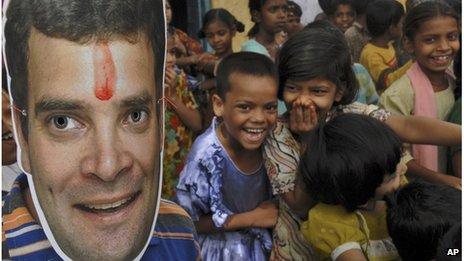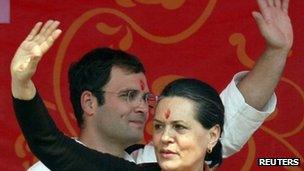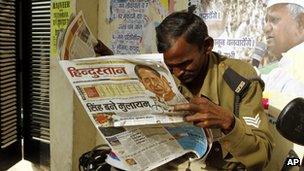The aftershocks of India state elections
- Published

'The failure of Brand Rahul in Uttar Pradesh is a body blow to the Congress party'
The failure of the Congress party in Uttar Pradesh which sends the largest number of MPs to parliament could not have come at a worse time for the scion of the Nehru-Gandhi dynasty, Rahul Gandhi, and the party.
The sole clear victory of the Congress in Manipur and its pyrrhic victory in Uttarakhand would mean nothing in the days to come as these two states are not game changers at the national level. Nor are Goa and Punjab where the Congress has lost.
The failure of Brand Rahul in Uttar Pradesh is a body blow to the Congress party because this is where the fourth-generation power aspirant from the Nehru-Gandhi family staked his future. Unless the party revives its fortunes in UP in the next two years, the prospects of a Congress-led government in 2014 are bleak.
Despite the media hype, the voters did not buy into Rahul Gandhi's public display of anger about the state of affairs in Uttar Pradesh.
His political stature, therefore, has not grown as a mass leader. He was seen as a babe in political woods and that image will continue to haunt him.
Complications
The morale in the party will sink to a new low as the electoral defeat is blamed on everyone else but the scion of the first family of the party - although he has taken responsibility for the defeat.
There are other complications for the future of the Congress party.
Prime Minister Manmohan Singh is already pushing 80 and will be 82 by the time the next general election takes place in 2014.

The matriarch of the Congress party, Sonia Gandhi, keeps indifferent health
The matriarch of the Congress, Sonia Gandhi keeps indifferent health - indeed despite her frequent visits abroad for health check-ups, no-one knows what she suffers from. If it is a disease of a serious nature, then she might be out of the election campaign in 2014.
The party then will have no option but to fall back on a Rahul Gandhi, seen as being defeated in Uttar Pradesh not once but twice - in 2007 and again in 2012 - to lead it in the general election.
Had Rahul Gandhi delivered a reasonably good performance in Uttar Pradesh, he might have had some time on hand to address the revival of the party in bigger states like Gujarat, Karnataka and Maharashtra.
Now the ghost of the defeat will sit heavily on him as he tries to rejuvenate the party elsewhere in India. However, he is unlikely to be taken seriously even by the local Congress leaders.
The rise of one more regional party in Uttar Pradesh will also add to the problems of governance at the centre.
As it is, the United Progressive Alliance (UPA) government does not have an easy relationship with the bigger states like West Bengal, Bihar, Orissa, Tamil Nadu, Karnataka and Gujarat. To this list, one might now have to add the state of Uttar Pradesh.
If one then looks at the map of India, large swathes of the country seem ranged against the centre. Never before has there been such a centre-state confrontation on a wide range of issues.
The central government and the states have been at loggerheads over the former's attempt to impose a public ombudsman on the states through the Lokayukta (Public Ombudsman) Bill.
Delhi's unilateral decision to set up a National Counter Terrorism Centre was perceived to be curtailing the rights of the states to deal with law and order.
And, there has been opposition to the Land Acquisition Bill and the attempt to dictate how the states should implement the provisions of the proposed Food Security Bill.
Belligerence
This crisis is likely to worsen as more states are governed either by regional parties or parties inimical to the Congress like the Bharatiya Janata Party. They will needle the central government on all issues which impinge on the federal relationship.

The regional parties are growing stronger
The regional parties are also likely to act in concert to take on the government on economic reforms and push it in a populist direction to continue with subsidies and sops.
And where the credit for the sops is likely to go only to the centre - as in the Food Security Bill - they will show intransigence and bargain hard to extract maximum benefits for the states.
This belligerence is likely to resurface in the presidential elections this June, forcing the Congress to either choose a compromise candidate acceptable to the bigger states like Uttar Pradesh and West Bengal or face an electoral defeat once again.
There is also a possibility that if regional parties feel a weakening of the centre, they might join hands to force a mid-term election to parliament.
This would suit the Samajwadi Party which has swept Uttar Pradesh, Mamata Banerjee's Trinamool Congress in West Bengal and Jayalalitha's AIADMK party in Tamil Nadu.
All of them can hope to improve their tally in parliament if elections are held sooner than later. Even Nitish Kumar (Janata Dal - United) in Bihar and Naveen Patnaik (Bjiu Janata Dal) in Orissa may not be averse to an early parliamentary election as it might make one of them a prime ministerial candidate of a non-Congress and non-BJP front.
The aftershocks of the Uttar Pradesh election results, therefore, will continue to mould political events in the run up to the next parliamentary election.
Bharat Bhushan is a Delhi-based journalist
- Published6 March 2012
- Published6 March 2012
- Published6 March 2012
- Published29 February 2012
- Published22 February 2012
- Published15 February 2012
- Published8 February 2012
- Published29 December 2011
- Published26 December 2011